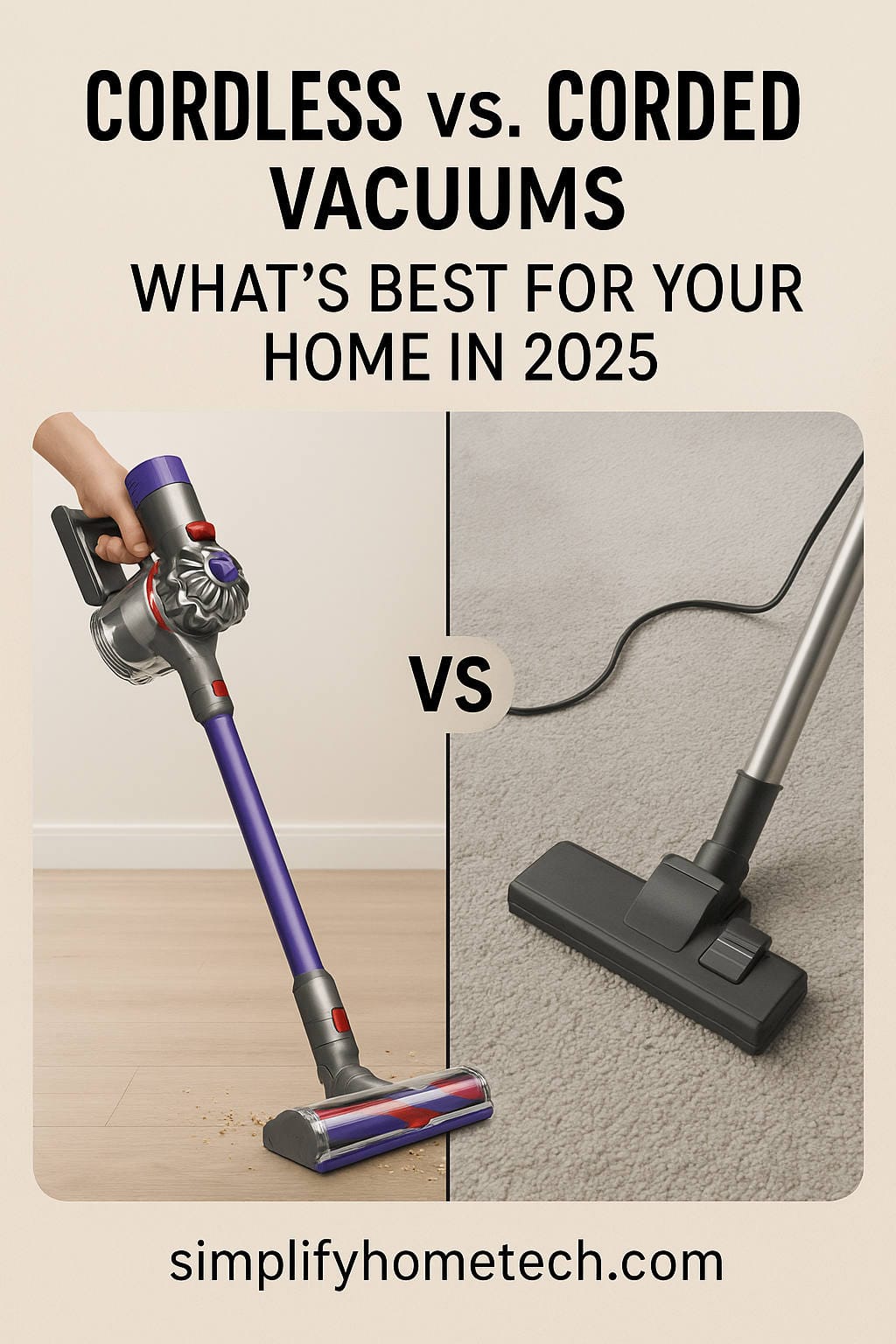Vacuum cleaners have evolved rapidly over the last few years, and in 2025, homeowners have more options than ever when it comes to choosing the right cleaning tool. One of the most common dilemmas faced by buyers is whether to go with a cordless or a corded vacuum cleaner. Both types come with their unique strengths and potential limitations, but the right choice largely depends on your home size, floor type, cleaning habits, and lifestyle.
If you’re trying to decide which type of vacuum cleaner to invest in, this detailed comparison will help you weigh all the important factors. From suction power to battery life, and portability to cost, we’ll explore every critical aspect that can impact your day-to-day cleaning experience in 2025.
Why the Right Vacuum Cleaner Matters More Than Ever
With modern homes featuring a mix of hardwood, tiles, area rugs, and high-pile carpets—not to mention pets, kids, and busy schedules—the role of a vacuum cleaner has become essential. A vacuum isn’t just a cleaning tool; it’s a time-saver and a contributor to better indoor air quality. Choosing between a cordless and corded model isn’t simply about mobility anymore; it’s about choosing the right cleaning partner for your home’s specific needs.
What You Need to Know About Cordless Vacuums
Cordless vacuum cleaners are the embodiment of modern convenience. They’ve grown in popularity because they’re lightweight, stylish, and easy to use. These vacuums run on rechargeable batteries and are designed for mobility, quick access, and everyday messes.
Benefits of Cordless Vacuums
- Total Mobility: The biggest selling point of cordless vacuums is freedom. Without a power cord tying you to a wall outlet, you can easily clean rooms, stairs, and even your car.
- Lightweight and Portable: Most cordless models weigh less than 8 pounds, making them easy to carry and perfect for users who don’t want to deal with heavy equipment.
- Compact and Easy to Store: Many cordless vacuums come with wall mounts or slim docking stations, making them ideal for apartments or homes with limited storage.
- Fast, Frequent Cleaning: Their ease of use encourages more frequent cleanups. If you have pets or kids, you’ll appreciate being able to grab your vacuum quickly for daily messes.
- Advanced Features: High-end cordless vacuums in 2025 come with smart sensors, auto-adjusting suction, LED displays, app integration, and even AI-assisted modes.
Drawbacks of Cordless Vacuums
- Limited Runtime: Most cordless vacuums offer between 20 and 60 minutes of runtime, depending on power mode and battery size.
- Battery Degradation Over Time: After a few hundred charge cycles, battery efficiency can decline, potentially requiring costly replacements.
- Smaller Dustbins: Due to their compact size, cordless vacuums usually have smaller dust containers that need frequent emptying.
- Pricey High-End Models: Premium cordless vacuums often cost more than corded models with similar suction capabilities.
What Makes Corded Vacuums Reliable and Powerful
Corded vacuums are the traditional go-to for deep and consistent cleaning. Though they may lack the portability of cordless vacuums, they continue to be popular for their powerful suction, unlimited runtime, and rugged durability.
Benefits of Corded Vacuums
- Consistent Power Supply: Plugged into an outlet, corded vacuums deliver stable, uninterrupted power, which translates to consistent suction from start to finish.
- Superior Cleaning Performance: Ideal for deep-cleaning carpets, removing embedded pet hair, and handling heavy-duty messes.
- Larger Dust Capacity: Corded models often have large dustbins or bags, allowing you to clean for longer without needing to empty or replace anything.
- Budget-Friendly Options: Entry-level corded vacuums tend to be cheaper than premium cordless models, making them great for budget-conscious buyers.
- Longer Lifespan: Without reliance on batteries, corded vacuums typically last longer and require less maintenance over the years.
Drawbacks of Corded Vacuums
- Limited Range: You’re tied to the nearest power outlet, which means constantly plugging and unplugging as you move between rooms.
- Heavier Design: Most corded vacuums are bulkier and more cumbersome to move, especially up and down stairs.
- Storage Challenges: These vacuums often take up more closet space and may not be ideal for compact living environments.
- Less Innovation: Corded models don’t typically include as many smart features as their cordless counterparts.
Cleaning Power: Which Vacuum Performs Better?
When it comes to raw suction power, corded vacuums still dominate. Thanks to continuous power delivery, they provide stronger and more consistent suction, making them perfect for high-pile carpets, large homes, or households with pets.
Cordless vacuums have made great strides, especially with newer digital motors and multi-cyclone technology. Brands like Dyson and Tineco offer cordless models that come close to matching the suction of mid-range corded vacuums. However, performance may dip when the battery starts to drain or if used on higher power settings.
If deep cleaning is a top priority, corded vacuums are still the safer bet.
Runtime vs Unlimited Operation: The Power Debate
Cordless vacuums operate on rechargeable batteries—usually lithium-ion. While battery life has improved significantly in 2025, it’s still limited by design. You’ll get between 20 to 60 minutes on average. If you’re using high-suction or turbo mode, that number drops fast.
Some high-end cordless models come with swappable battery packs, allowing you to double the runtime. However, you’ll need to invest in spare batteries, which can be pricey.
Corded vacuums, by contrast, don’t have this issue. You can clean for as long as you want without stopping to recharge. If you prefer marathon cleaning sessions or have a large house, this advantage is significant.
Maneuverability and Ease of Use
Cordless vacuums shine in terms of maneuverability. You can clean under furniture, over stairs, and in your car with minimal hassle. They’re ideal for elderly users, individuals with back pain, or anyone looking to reduce physical strain.
Corded vacuums, while powerful, often require you to manage a cord, replug when changing rooms, and push a heavier unit across your floors. They’re more suitable for scheduled deep-cleaning days rather than quick spot-cleaning.
Dustbin Size and Maintenance Needs
The dustbin capacity is typically smaller in cordless vacuums. You may find yourself emptying the bin after every session, especially if you have pets or a high-traffic household. Some cordless models now feature one-click dirt ejection systems to make this process cleaner and faster.
Corded vacuums come with large dustbins or disposable bags. While that means fewer trips to the trash, bagged models do require the ongoing cost of replacement bags. However, they tend to be more hygienic, especially for allergy sufferers, since bags trap dust and allergens more effectively.
Noise Levels: Which is Quieter?
Cordless vacuums are generally quieter than their corded counterparts. This is because of their smaller motors and the trend toward noise-reducing design. They’re perfect for early-morning or late-night cleaning without disturbing housemates or neighbors.
Corded vacuums, particularly older models or high-power ones, tend to be louder. Newer models have improved on this, but they’re still not as quiet as the average cordless vacuum.
Technology and Smart Features in 2025
Cordless vacuums lead the way when it comes to smart features. In 2025, many cordless models include:
- App connectivity for tracking cleaning time and battery life
- Voice assistant integration (e.g., Alexa, Google Assistant)
- Auto-detection of floor types
- Suction power adjustment based on dirt level
- LED headlamps for better visibility
Corded vacuums have been slower to adopt these tech features. Some high-end models include digital displays or sensor-driven suction control, but they lack the advanced interactivity of cordless smart vacuums.
Energy Efficiency and Environmental Impact
Cordless vacuums are more energy-efficient per session and often certified with Energy Star ratings. However, battery manufacturing and disposal raise environmental concerns. Lithium-ion batteries must be disposed of properly, and replacements contribute to electronic waste.
Corded vacuums don’t rely on batteries, which means fewer resource-intensive components. While they may draw more electricity during use, they often last longer and generate less long-term waste.
If environmental sustainability is important to you, consider:
- Buying from brands that offer recycling programs
- Choosing models with replaceable and recyclable filters
- Looking for vacuums with eco modes or low power consumption
Cost Considerations: Initial vs Long-Term Value
Cordless vacuums tend to be more expensive up front. Premium models can cost between $400 to $800, especially those with extra batteries and advanced features. In addition, you may need to factor in battery replacements every few years.
Corded vacuums usually cost less—starting from $100 for basic models to $400 for high-end versions. Their long-term maintenance costs are generally lower, and there’s no need to worry about battery degradation.
For budget-conscious buyers or those who don’t want to keep buying accessories, a corded model may be the better investment.
Who Should Choose a Cordless Vacuum?
Cordless vacuums are perfect for:
- Apartments or small homes: Less space means shorter cleaning times and better use of battery life.
- Families with kids: For daily messes like crumbs and spills, cordless vacuums offer quick clean-up without hassle.
- Pet owners: Pet hair on hardwood floors or furniture can be managed easily with handheld cordless attachments.
- Busy professionals: If you don’t want to schedule a deep-cleaning day every week, a cordless vacuum keeps things tidy on the fly.
- Tech enthusiasts: Love smart home gadgets? Cordless vacuums bring all the bells and whistles.
Who Should Stick with a Corded Vacuum?
Corded vacuums are ideal for:
- Large homes: Clean multiple rooms without stopping to recharge.
- Deep cleaners: If you clean carpets, upholstery, and rugs thoroughly every week, a corded vacuum delivers superior power.
- Allergy sufferers: Bagged corded vacuums often include HEPA filtration, ideal for trapping allergens.
- Budget buyers: You can get excellent cleaning performance at a fraction of the cost of a high-end cordless unit.
- Low-maintenance seekers: No charging, fewer replacements, and a long-lasting motor make corded vacuums hassle-free over time.
Final Verdict: Which Vacuum Should You Choose in 2025?
The right vacuum cleaner is the one that matches your cleaning habits, home layout, and lifestyle.
Choose a cordless vacuum if you want:
- Ultimate convenience
- Lightweight, portable design
- Tech-savvy features
- Fast, daily cleaning power
Choose a corded vacuum if you prefer:
- Strong and consistent suction
- Long-term reliability
- Deep cleaning for large spaces
- Lower initial and maintenance costs
In fact, many households today are choosing to own both. A cordless vacuum handles daily messes and quick jobs, while a corded model is reserved for weekly deep cleans. This dual approach ensures maximum flexibility and performance.
You might also like,

